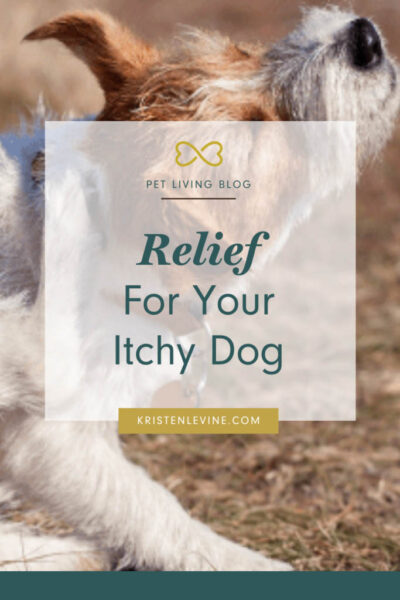
Relief for Your Itchy Dog
Have you ever had an itchy bug bite? Or maybe an allergic reaction to something like poison ivy? Chances are that you have, so you know how much even a little itch can drive you completely crazy!
As you probably know, dogs can get itchy too. There are minor itches they can take care of with a good scratch. But for some dogs, itchy skin can be chronic, leading to irritated skin, and can have a negative effect on their quality of life and that of their parents.

We dealt with Chilly’s chronic itch for many years. He has allergic itch, so many natural things in our environment would trigger an attack of itchiness and foot licking. We had to be really careful to avoid tall grasses when we took him for playtime or walks, and we were constantly wiping him down after being outside and bathing him once or twice a week to make sure we removed any allergens from his coat before they irritated his skin. But no matter how careful we were, he would break out anyway.
If you’ve gone through this with your pup, you know how upsetting and frustrating it is. Watching your furry friend scratch, bite, or lick can leave any pet parent feeling a little helpless. It can also impact the bond you enjoy. Many dogs that suffer with chronic itchiness begin to lose interest in the things they used to love doing with their people, like playing or going for walks. Not to mention that no one wants to share a bed or sofa with an itchy dog who can’t stop squirming and scratching.
I recently had the chance to speak with Dr. Dana Liska, a veterinary dermatologist with Zoetis, about how to find relief for itchy dogs. According to Dr. Liska, skin allergies are the number one reason for vet visits, yet many dogs continue to suffer because their parents underestimate the frequency and severity of their dog’s itching and do not seek medical care to help them. I wanted to provide dog parents with the information they need to recognize itching in their pups and to get them the help they need.
Common Causes of Itchy Dog Skin
Depending on what is causing the allergy, your dog may suffer seasonally or all year round. Common causes of allergic reactions in dogs include fleas, food allergies, and environmental allergens like mold, pollen, or dust mites.
Your veterinarian can provide a full diagnostic workup to find the source of your dog’s itching. Once you know what’s causing it, you can determine whether it can be cured or managed with diet, allergy medication, or flea control.
How Itchy is Too Itchy?
An occasional itch is perfectly normal. However, if it begins to impact your dog’s quality of life, it’s a sign of trouble. Itchiness shouldn’t interfere with activities or lead to hair loss or skin damage.
Besides being doggone uncomfortable, untreated itchiness can lead to additional problems. Broken or damaged skin creates the perfect breeding ground for bacteria, which can lead to infection.
It goes without saying that, if your dog suffers from anything more than an occasional itch, you should talk to your veterinarian. Some common signs of allergic skin disease include:
- scratching
- biting
- licking
- rubbing
- scooting
It’s also important to note that untreated symptoms can become worse over time. So, identifying and treating allergic skin conditions early is important for your dog’s quality of life. Unfortunately, over the counter remedies, like antihistamines, are not designed for pet’s skin allergies and at-home-treatments don’t provide adequate relief for most dogs.
In Chilly’s case, injections with CYTOPOINT® were a real game changer. Within a few days, his itchiness goes away completely and it’s usually 6-8 weeks before he needs another injection, (4-8 weeks for most dogs). We can now walk him anywhere without worry or having to wipe him down afterwards. Finding the right treatment for him has not only made him more comfortable, but it has improved quality of life for both Chilly and for us!
Getting Help for Itchy Dogs
CYTOPOINT is a monoclonal antibody which is a biological medication. It’s a protein, not a chemical, which works like your dog’s own immune system. It blocks itch signals from reaching your dog’s brain so the constant scratching, chewing, and biting can stop and his skin can begin to heal.
Just one CYTOPOINT injection starts controlling allergic itch within one day and provides relief that lasts for 4 to 8 weeks. After your first injection, you should set up a progress examination with your veterinarian to monitor your dog’s condition to determine when it’s time for his next treatment.
You can also visit CYTOPOINT’s website and download a free itch tracker that will help you and your veterinarian monitor your dog’s condition and schedule treatments when he needs them.
I’m so thankful that we no longer have to worry about Chilly being uncomfortable due to his skin allergies. If you are the parent of an itchy dog, talk to your veterinarian about whether CYTOPOINT injections could be the solution that ends your dog’s itch once and for all.
This is a sponsored post. However, all opinions and anecdotes are my own, and I never promote any products or brands I don’t believe in. ~Petfully yours, Kristen
Kristen Levine has a consulting relationship with Zoetis.







Comments (0)